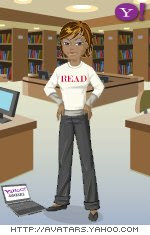- Anyone (registered or unregistered, if unrestricted) can add, edit, or delete content.
- Tracking tools within wikis allow you to easily keep up on what has been changed and by whom.
- Earlier versions of a page can be rolled back and viewed when needed.
- Users do not need to know HTML in order to apply styles to text or add and edit content. In most cases simple syntax structure is used.
As the use of wikis has grown over the last few years, educators and librarians all over the country have begun to use them to collaborate and share knowledge. Among their applications are pathfinder or subject guide wikis, book review wikis, conference wikis and best practices wikis.
Discovery Exercise:
- For this discovery exercise, take a look at some education wikis and blog about your findings. Here are a few examples to get you started:
Book Lovers Wiki - developed by the Princeton Public Library.
Blogging Libraries Wiki
iTunesU wiki for colleges and universities
Library Success: A best practices wiki
NCAA Wiki (featuring UC Berkeley)
SJCPL Subject Guides – a pathfinder wiki developed by the St. Joseph County Public Library system. - Create a blog post about your findings. What did you find interesting? What types of applications within libraries and colleges might work well with a wiki?
Discovery Resources:
Use these resources to learn more about wikis:
- Wiki, wiki, wiki - from the Core Competency blog of the Public Library of Charlotte-Mecklenburg County.
- Wikis: A Beginner’s Look – an excellent short slide presentation that offers a short introduction and examples.
- What is a Wiki? – Library Success wiki presentation.
- Using Wikis to Create Online Communities – a good overview of what a wiki is and how it can be used in libraries.
So what's in a wiki? Find out by doing some exploring on your own.
[Note: Please remember to include THING# in your heading posts.]
NEXT UP: #17 CSM Learning 2.0 Wiki

